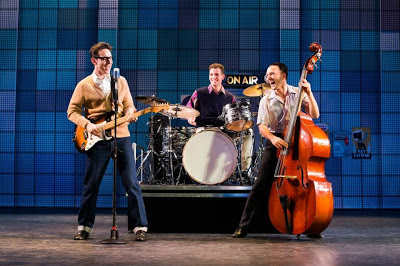Buddy
The Buddy Holly Story
Cadillac Palace Theatre, Chicago
Run Ended
@@@@
Despite likely giving it more thought than most, I find myself challenged to clearly and concisely define the difference between--and among--"revues" and "jukebox musicals" within the realm of musical theater.
Whereas "Broadway musicals"--even those that have never actual been produced on Broadway--most traditionally have featured newly written songs that support and further a storyline, revues and jukebox musicals (many of which have run on Broadway) enlist tunes that already exist.
I typically think of a revue as employing songs originally written for the stage, newly compiled to spotlight a composer (e.g. Stephen Sondheim), choreographer (Bob Fosse), performer (Chita Rivera), etc.
Revues can vary in how much storyline--or as apt, biography--accompanies the musical numbers. Usually the "book" (i.e. script) is pretty flimsy, or even non-existent, but a few years ago I saw an excellent revue of Stephen Schwartz (Wicked, Pippin, Godspell) called Snapshots, which featured old songs from prior musicals in the service of a new narrative.
Revues can vary in how much storyline--or as apt, biography--accompanies the musical numbers. Usually the "book" (i.e. script) is pretty flimsy, or even non-existent, but a few years ago I saw an excellent revue of Stephen Schwartz (Wicked, Pippin, Godspell) called Snapshots, which featured old songs from prior musicals in the service of a new narrative.
Since Mamma Mia burst onto the scene around the turn of the century, Broadway and the West End have seen a proliferation of "jukebox musicals," which primarily utilize pop songs of a particular artist or style, also accompanied by a book of varying narrative degrees.
Some jukebox musicals, such as Michael Jackson's Thriller--which I saw in London a couple years ago and which some may, not incorrectly, label a revue--are little more than a string of live performances of hit songs. But Mamma Mia actually told a story, albeit slight, through its use of ABBA songs. And Jersey Boys--the other standout among jukebox musicals--uses Four Seasons songs to tell the story of Frankie Valli and the Four Seasons, but in doing so puts across a fairly robust, univeral tale.
 Anyway, over the weekend I saw Buddy: The Buddy Holly Story, which dates back to 1989, making it one of the very first "jukebox musicals."
Anyway, over the weekend I saw Buddy: The Buddy Holly Story, which dates back to 1989, making it one of the very first "jukebox musicals."
Although it does attempt to sketch the all-too-brief career arc of its title character--albeit with some creative liberties--and thus is more so a theatrical work than simply a cover band or tribute artist playing a collection of Holly gems, as a "musical" it is not nearly as story-based nor insightful as Jersey Boys nor The Million Dollar Quartet (the latter is still playing at Chicago's Apollo Theater).
But over the course of 2 hours and 15 minutes, Buddy was never less than enjoyable.
This production has now left town, so this review is rather moot, but Kurt Jenkins (one of two rotating leads) does a nice job as Buddy Holly.
No, he neither looks nor sounds exactly like the original, but was close enough to remind that the man born Charles Holley in Lubbock, Texas, wrote a hefty helping of pioneering rock classics that still sound fresh 55 or so years later. And he wrote them all before the age of 22, without many influences to draw upon (though I found it interesting to note, through Wikipedia not the show, that Buddy Holly opened for both Elvis Presley and Bill Haley in 1955).
I certainly didn't get any great insight about Buddy through this musical, which I'd seen in a local production at the Drury Lane Oakbrook in 2008, but most of major milestones are touched upon: recording with Norman Petty, having hit singles, playing the Apollo, meeting & marrying Maria Elena, splitting with The Crickets, playing the Surf Ballroom in Clear Lake, IA and dying in a plane crash along with Richie Valens and the Big Bopper.
Faithfully delivered, live on stage by Jenkins, the faux Crickets and the backing musicians at the Surf show, it was hard not to smile at "That'll Be the Day," "Everyday," "Peggy Sue," "Oh Boy," "Words of Love," "Heartbeat," "Rave On" and others (including Valens' "La Bamba" and the Big Bopper's "Chantilly Lace."
So although there's not much theatricality to Buddy--and it's likely not much more satisfying than seeing the same musicians just performing a concert of these great songs--if you get a chance to catch this show the next time it swings through your town, well all right, just enjoy it.



No comments:
Post a Comment